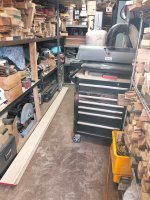We moved into our retirement home and I went from a double garage which was only used as a workshop to a single garage where I need to share space with a car :'(
I came to realise I need to make drastic changes to continue my hobby and will probably need to get rid of my tablesaw, planer thicknesser, drum sander and big dust extractor (all Jet).
Since i am already heavily invested into Festool I need some encouragement, tips and workflow suggestions from fellow woodworkers that went through the same situation to help highlight how the work of my Jet machines can be done with Festool alternatives?
I came to realise I need to make drastic changes to continue my hobby and will probably need to get rid of my tablesaw, planer thicknesser, drum sander and big dust extractor (all Jet).
Since i am already heavily invested into Festool I need some encouragement, tips and workflow suggestions from fellow woodworkers that went through the same situation to help highlight how the work of my Jet machines can be done with Festool alternatives?

